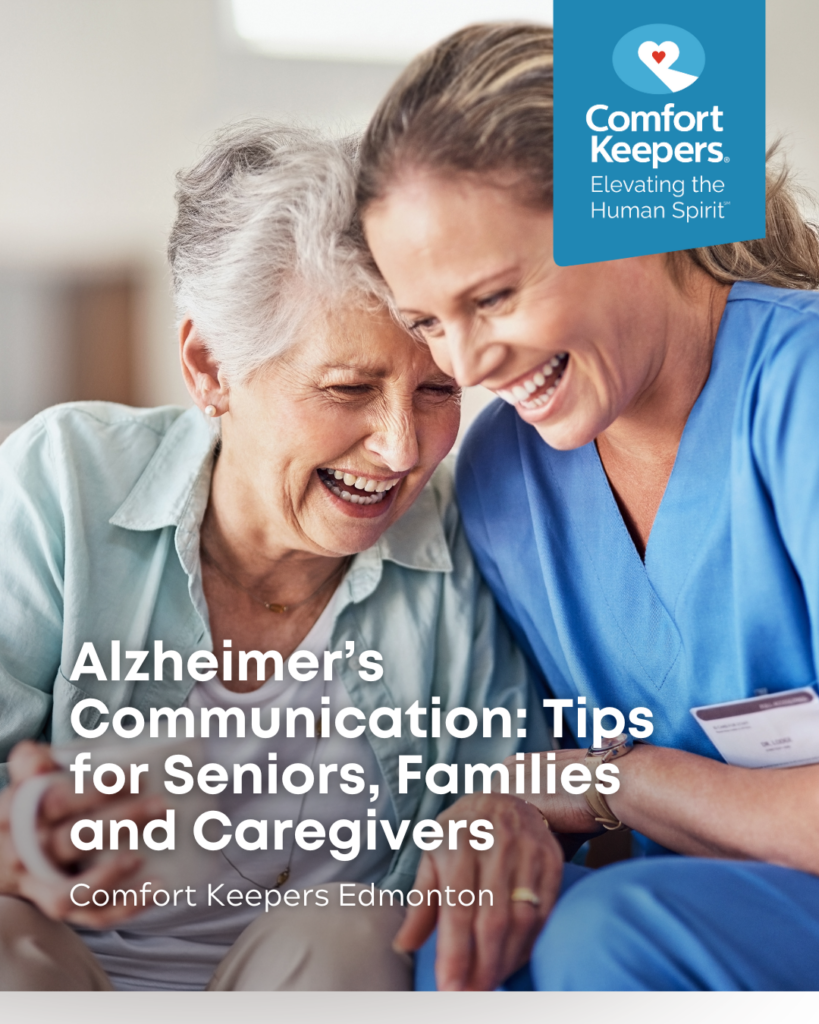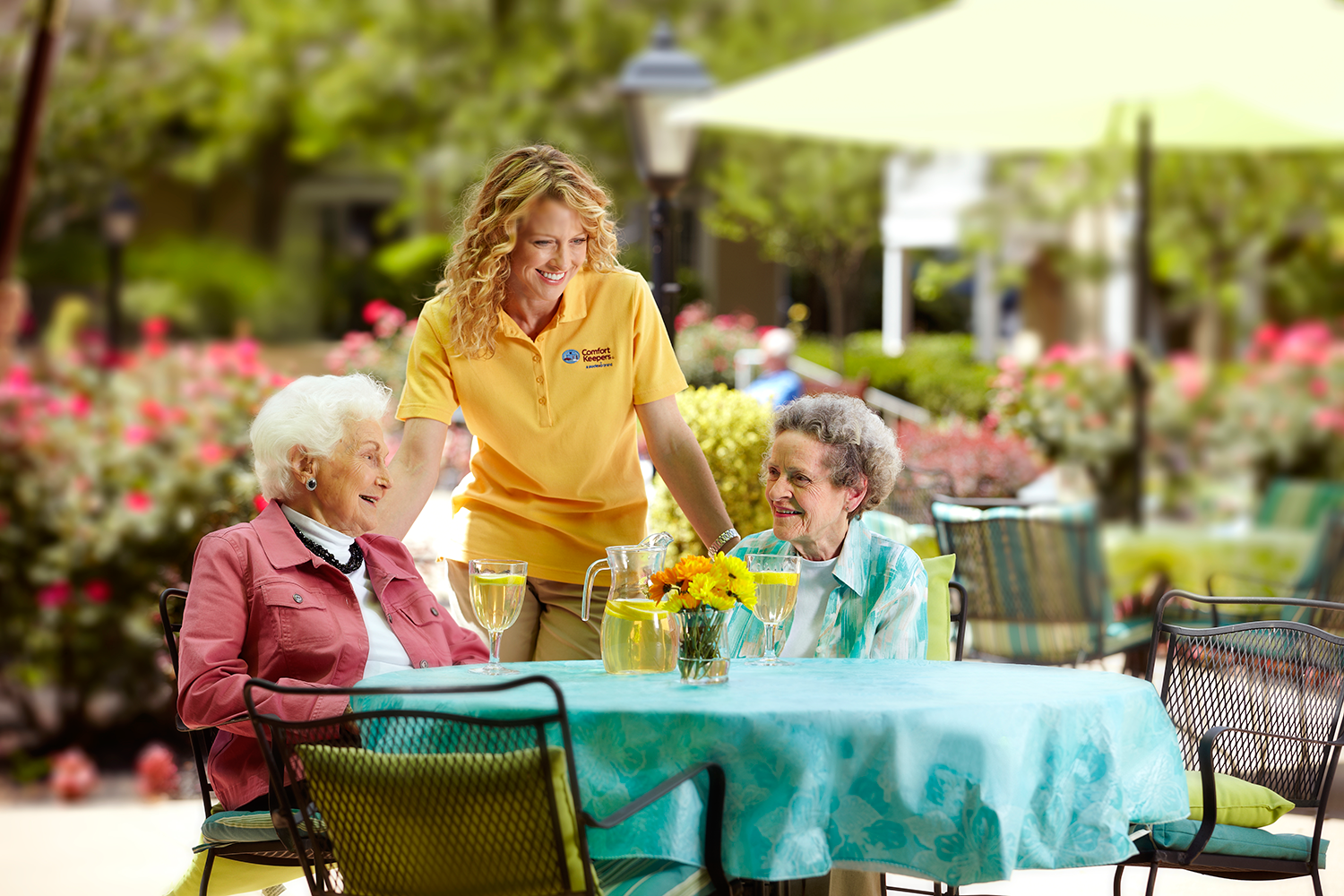Alzheimer’s Communication: Tips for Seniors, Families and Caregivers
Seniors and Alzheimers | September 23, 2024

What Every Senior in Edmonton, AB, Needs to Know About Alzheimer’s Communication Tips
Alzheimer’s Communication Tips | The most debilitative and indicative symptom of Alzheimer’s is the gradual loss of words. Understanding this is crucial to basic communication that most of us take for granted.
Alzheimer’s patients realize there is a problem, even though they may not have the capacity to understand what is happening. This can cause instances of confusion, fright, and frustration for the sufferer of Alzheimer’s disease as well as for loved ones and caregivers of those with Alzheimer’s.
To help those dealing with seniors who are suffering from Alzheimer’s, the Alzheimer’s Association™ suggests the following tips to achieve better communication despite the disease.
Alzheimer’s Communication Tips for Seniors
Tip #1 – Changes in Communication and Behaviour
It is important to learn to recognize the changes in communication and behaviour in those with Alzheimer’s. Secondly, learn how to assist in communication, and then to identify and adapt to efficient ways of communication unique to the individual Alzheimer’s sufferer.
Tip #2 – Be Patient and Supportive
Know that is important to be not only patient but also supportive when trying to communicate. Take the time to listen with no interruptions or criticisms. Offer reassurance that they can take their time to try to form their thoughts into proper words and try not to correct any misused words.
Tip #3 – Focus on Emotion, Nuances and Voice Tone
Many times there is meaning behind those words and if you take the time you may discover what that is. Focus on the emotion that may lie within the words. Nuances in voice tone as well as hand gestures or facial expressions can be critical for you to observe and analyze to determine the meaning behind the words being spoken.
Tip #4 – Remain Calm and Practice Patience
At times you may become angry or frustrated yourself but understand that criticizing or arguing only serves to increase levels of discomfort and agitation for those with Alzheimer’s. Instead, practice patience and offer occasional suggestions for words they are trying to speak. When appropriate, retreat to a quiet place to communicate.
Tip #5 – Over Stimulation
Noise and crowds may intimidate the Alzheimer’s patient, resulting in increased frustration and anxiety as well as decreased verbalization. Sometimes, all the person needs is a bit of quiet to organize their thoughts and correctly verbalize them.
Tip #6 – Be Prepared for Repetition
In the late stages of Alzheimer’s, there are other measures you can take to improve communication efforts. Let the person know who you are to create a sense of familiarity. Use simple words and sentences and speak slowly in a lowered tone of voice.
Be prepared to repeat your questions or information you are imparting, and also be prepared for Alzheimer’s sufferers to repeat themselves. Be respectful, calm, and caring in your actions and tone of voice. Using signals or written words to communicate or as reminders can be extremely helpful.
Tip #7 – Remain Positive
Above all, remain positive even in the face of adversity. Alzheimer’s disease is extremely trying for the patient and the caregiver, family member, or friend who is dealing with a loved one suffering from Alzheimer’s.
Remember, the challenges are neither your fault nor theirs. Patience, understanding, and compassion on your part can mean the difference between failure and success in effective communication.
Comfort Keepers® Edmonton is Proud to Offer a Wide Range of Home Senior Care Services
Our trained caregivers will ensure your loved one is comfortable, independent and safe in their home. On top of that, we will also aim to enhance their overall health, quality of life and general happiness.
Top-Notch Home Healthcare for Seniors in Edmonton, Alberta
Comfort Keepers of Edmonton offers a wider range of senior care services. We offer retirement care, respite care, senior care, companionship care, end-of-life care, post-surgery care, palliative care, personal care, and senior living transition services. If you are concerned about the health and well-being of your aging loved ones we can help with 24-hour care and more!
Helping Seniors Age-in-Place with Companionship Care and Interactive Caregiving™
Empathetic care starts in the heart and allows us to meet our client’s needs. Our trained caregivers are selected with one specific quality in mind, empathy. We strive to stimulate our clients emotionally, mentally and socially, thus enhancing their overall quality of life.
Our Interactive Caregiving™ provides a system of care that addresses companionship, safety, nutrition, mind, body, and activities of daily living (ADLs). The system increases seniors’ sense of well-being, independence and companionship by focusing on Senior Mind, Senior Body, Senior Nutrition, and Senior Safety.
Affordable and Client-Directed Homecare is Available for Qualifying Albertans
Comfort Keepers® Edmonton is an Approved Service Provider for the Client Directed Homecare Invoicing (CDHCI) Program Offered by Alberta Health Services.
What is the Client Directed Home Care Invoicing Program (CDHCI)?
CDHCI is a great program provided by Alberta Health Services (AHS), allowing clients to choose an approved agency like, Comfort Keepers Edmonton for Personal Care, Respite Care and Homemaking needs. The chosen agency can then bill AHS directly for services rendered for approved hours through Alberta Blue Cross. Read more about the program HERE.
Accredited Home Care Edmonton
Comfort Keepers® Edmonton was awarded the “Accredited with Exemplary Standing” seal by Accreditation Canada. This honour demonstrates Comfort Keepers’ commitment to offering safe, high-quality home care to its senior clients in Edmonton, AB.
To learn more about senior in-home care in Edmonton, contact the Comfort Keepers® office. Our service territory includes Edmonton, Devon, Sherwood Park, Stony Plain and surrounding areas, contact the Comfort Keepers Edmonton office at 780-465-4665.
References
Alzheimer’s Association. Communication and Alzheimer’s. Retrieved on November 8, 2010
Individualized Home Care Options
Long-Term Home Care, 24 Hour Home Care & Short Term Care Options Customized for You







